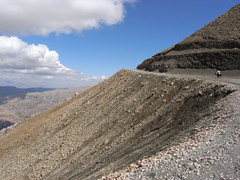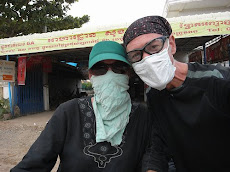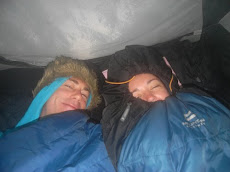We passed a giant concrete fruit on its island of green and then miles of factories and mechanics workshops and then the road stretched out before us across the flat desert, not a bend in sight. It was a vast landscape where pylons receded as far as I could see towards the point of infinity and distant trains moved slowly, like giant millipedes. It was a landscape where you could see where you would be later in the day and the views changed in hours. In the absence of any significant vegetation or buildings we found that drainage tunnels under the road made perfect toilets!
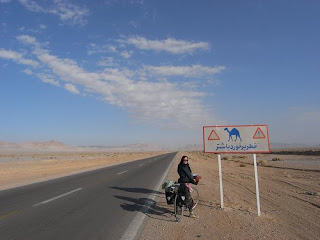
During the day the sun shone and its gentle November warmth made great cycling weather but once the sun started its descent towards the distant mountains the temerature plummeted. We got in the tent and I put on all the clothes I had (3 pairs of socks, long-johns, trousers, t-shirt, 2 long sleeved tops and 2 fleeces, hat and gloves!). The temperature got down close to freezing and we were zipped into our slepping bags like two giant pupae. It was bearable but not pleasant.
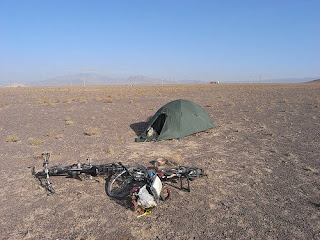
After two days we reached Na'in and were taken in by two students who advised us against staying in the tawdry place we were looking at as it was "dirty". We were amused to find their flat had a stolen roadsign and to be dirtier than the inn we had been looking at! But they were genial and amusing hosts and we all slept on their floor Iranian style.

Next day a chill east wind made the lead grey sky and flat brown landscape feel more like a winters day in The Wash than the deserts of Persia. As we cycled along the only distraction was the occaisional ruins of caravansaries, relics from the days of the silk route camel trains but now their mud bricks were slowly eroding back into the sand from where they came. To break the monotony we diverted for a look around the ancient adobe lanes and buildings of Abaq, brown, dusty and crumbling. During the night it rained softly on the tent and was still pattering in the morning - so much for desert!
We passed a family of magnifiscent Imperial Eagles by the roadside on the way into Arkadan, where I ate camel kebab for lunch. We followed the sign and asked directions for the road to ChakChak and soon found ourselves on a dirt road in a gravelly expanse of absolute nothing - apart from rubbish which once dumped in such a landscape literally blows for miles until it catches on any flimsy piece of desert scrub. After a few miles the "road" was sand and impossible to ride. We didn't see any other living thing for 10 miles. The pure silence was magical after the nearly constant stream of beeping trucks on the highway. We camped a cold night in this nothingness and unbeknown to us we were lost in the desert. This fact became apparent the following morning when after passing through drifted sand and the bleached white carcasses of a cow and camel we came across a small oasis village that was not on our map. We eventually ended up back on the highway having cycled a big loop and no closer to ChakChak.

We tried a different route and late in the afternoon cycled off the highway down a dirt road, past rocky hills glowing orange as the sun set over the desert and a beautiful full moon rose. It was a magical, tranquil place to camp the night and the kind of cycling I had dreamed of when planning this trip. In the morning the water in our bottles was frozen. We eventually found ChakChak, an importatnt Zoroastrian pilgrimage site set halfway up a cliff. We had not passed anywhere to get provisions since Arkadan and due to getting lost had been travelling an extra day, which became a bit desperate when the 25km to Karanaq turned out to be mostly uphill - we had a tin of tuna and a last handful of nuts for lunch.


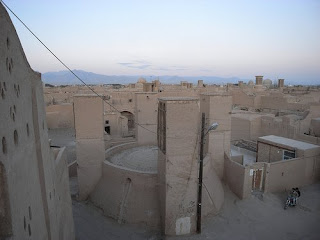
From Yazd we headed south-east passing through the salt desert oasis of Bafgh with its date palms and camels. A conservative place where all women wore chadors, the police called in to quizz us and I spoke to some classes of english students. The barren hills to the north-east of town are home to some of the last remaining asiatic cheetahs. The vast Iranian deserts also have populations of leopard, hyena and wolf but we were not lucky enough to see any.
 An incorrect map, a dispairing headwind and a balls up on my part meant that two days into the desert from Bafgh were were almost out of water with nothing but a hot sun beating on the desolation - we took the occaisonal sip from our last cupful to stave off "dry mouth". It was perhaps this that was to blame for Tracey falling off her bike on the way into Nuk and bruising her leg. We seemed to have crossed some kind of threshold. Children as young as 10 were driving around on motorbikes, pestering us like buzzing flies and people were literally coming out of their houses and shops to stare at us in silence as we passed. Women seemed to be in short supply whilst Baluchi men dominated the streets with their big beards, baggy clothes and headscarves. We were also cycling through the pistachio nut growing capital of Iran - mile after mile of nut bushes and desert. We stopped for a night in Rafsanjan and the following day, aided by a backwind for a change, rode 70 miles along the highway into the city of Kerman as the sunset turned the sky behind us into a breathtaking golden candyfloss.
An incorrect map, a dispairing headwind and a balls up on my part meant that two days into the desert from Bafgh were were almost out of water with nothing but a hot sun beating on the desolation - we took the occaisonal sip from our last cupful to stave off "dry mouth". It was perhaps this that was to blame for Tracey falling off her bike on the way into Nuk and bruising her leg. We seemed to have crossed some kind of threshold. Children as young as 10 were driving around on motorbikes, pestering us like buzzing flies and people were literally coming out of their houses and shops to stare at us in silence as we passed. Women seemed to be in short supply whilst Baluchi men dominated the streets with their big beards, baggy clothes and headscarves. We were also cycling through the pistachio nut growing capital of Iran - mile after mile of nut bushes and desert. We stopped for a night in Rafsanjan and the following day, aided by a backwind for a change, rode 70 miles along the highway into the city of Kerman as the sunset turned the sky behind us into a breathtaking golden candyfloss.
Our guidebook had led us to expect Kerman to be full of nomadic types, straight out of the desert but it was a faily modern place with men dressed like they were straight out of Saturday Night Fever. To the east of Kerman lies the vast Lut Desert - one of the most inhospitable places on Earth. In summer temperatures can go above 60C and in the winter below -20C. Thankfully we were between these extremes of temperature and two Hungarian tourists invited us to join their taxi tour to see the desert and strange sandy rock formations. Beyond this desert lie the Afghan and Pakistan borders and this lawless region is where the majority of europe's heroin is smuggled through and home to the Jundollah extremists. In recent years there has been the occaisonal tourist kidnapping and terrorist acts (blowing up buses, that kind of thing) along the route from Kerman to the Pakistan border so we decided to travel by bus rather than cycle.

We had hoped to keep a low profile but when we showed up at the bus station on our bikes for the overnight trip we were completely surrounded by exciteable and curious Iranians who caused a right scene! I am a light sleeper at the best of times and hardly slept on the bus. In the freezing cold of dawn outside Zahedan bus station we warmed our hands on a burning truck tyre alongside a soldier and two young Afghan refugees.
Getting the final 70km to the border was a bizarre experience. We wanted to take a bus and were told that one left in an hour. When we went to go back into the bus station we were instead told by the soldiers to follow their motorbike on our bicycles - we assumed to another bus station. After a mile or so they met up with a police car and we were told to follow that. After another mile we met up with a different police car and were told to follow them - which we did, right through the centre of town (thus maintaining our low profile!), then out of the town altogether. Wandering what the hell was going on and fretting about missing our bus we stopped them to ask where the bus was. "What bus?" was the reply! Something had clearly been lost in translation.
We cycled on to a police checkpoint on the edge of town and from there we had to put our bikes and all our bags into the back of a police pick-up truck and were driven a couple of miles to the next police check point, where we had to unload it all. Then they stopped a random passing motorist to put our bikes and bags in his pick-up and for him to drive us 35km to the next checkpoint whilst our police escort stayed behind - quite how this was keeping us or anyone else safe was beyond us. At the next checkpoint the army took over and took our passports and we had to wait what seemed like ages in a biting cold wind in the middle of the desert for them to pursuade two random motorists with pick-ups to take us, our stuff and our soldier escort to the next ckeckpoint. We passed two recently smashed up pick-ups as we hammered along the road in typical Iranian suicide fashion. As we did so we passed a police speed check and the bloke carrying us (who was only trying to keep up with the pick-up in front that had the soldier and our stuff) got done for speding! This was completely outrageous and he was justifiably livid but got a ticket all the same - which made us feel even worse about the whole situation. At the next checkpoint we got a new soldier escort who flagged down another unsuspecting pick-up driver who finally took us to the border. Once in Pakistan we realised we had stepped into a filthier and more colorful world.
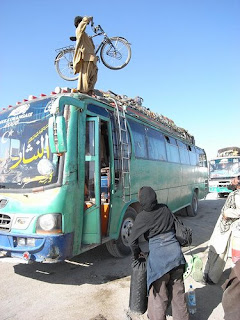



















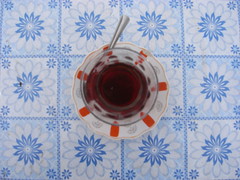






 Cappadocia is a fantastic place with a Star Wars landscape and we found the holiday we had been searching for - a lovely campsite with great views, swimming pool, excellent toilets and hot water for a tenner a night! But the real pleasure was that every other lunatic making a long distance journey by bicycle/motorbike also stopped in there and we had a great time sharing drinks, stories and laughs with other travellers from around the world.
Cappadocia is a fantastic place with a Star Wars landscape and we found the holiday we had been searching for - a lovely campsite with great views, swimming pool, excellent toilets and hot water for a tenner a night! But the real pleasure was that every other lunatic making a long distance journey by bicycle/motorbike also stopped in there and we had a great time sharing drinks, stories and laughs with other travellers from around the world.

 Tracey's knee recovered enough for us to cycle slowly over the pass before a tremendous downhill that took us past villages where houses were made of mud, rock and wood, cow dung was used as fuel (could this be the answer to the oil shortage?) and donkeys were beasts of burden. We stopped in the village of Ganbeyli for supplies and the men were all wearing traditional trousers (baggy crotch and legs tight from the knee down) and a variety of hat styles. One old man gave me his rosary beads in exchange for a look through my binoculars - something he may still be regretting as he pointed them straight at the sun!
Tracey's knee recovered enough for us to cycle slowly over the pass before a tremendous downhill that took us past villages where houses were made of mud, rock and wood, cow dung was used as fuel (could this be the answer to the oil shortage?) and donkeys were beasts of burden. We stopped in the village of Ganbeyli for supplies and the men were all wearing traditional trousers (baggy crotch and legs tight from the knee down) and a variety of hat styles. One old man gave me his rosary beads in exchange for a look through my binoculars - something he may still be regretting as he pointed them straight at the sun!
